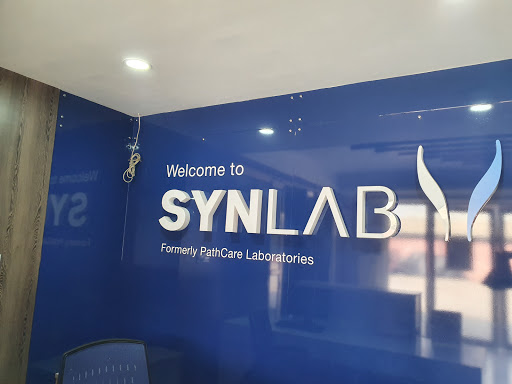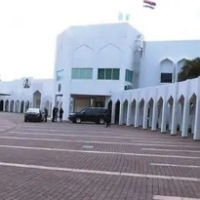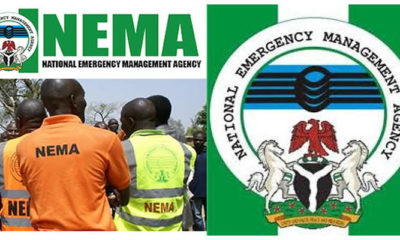NEWS
NEC Orders Immediate Grain Distribution To States

The National Economic Council (NEC) has instructed the National Emergency Management Agency (NEMA) to promptly distribute grains to states within one or two weeks in an effort to reduce the cost of food items across the country.
Governor Bala Mohammed of Bauchi State made this announcement while addressing journalists about the outcomes of the NEC meeting held at the Presidential Villa in Abuja on Thursday. Vice President Kashim Shettima chaired the meeting.
Governor Mohammed stated that Vice President Shettima had directed NEMA to release the grains immediately, and the states would be actively involved in the distribution process.
Expressing concern about the soaring prices of food items, the governor emphasized that food was a significant aspect discussed during the council’s meeting.
As a result, the council engaged with the Ministry of Agriculture, NEMA, and the Central Bank of Nigeria (CBN) to address the situation.
Mohammed said “We have some buffer stock that is already there with NEMA, so the council directed that the states will immediately be allocated substantial portions of food items, grains and so on for distribution so that the prices of foodstuff will come down.
“These grains will be given at subsidised rates or at the rates they were acquired. The CBN’s Anchor Borrowers Programme and its Agric programmes have ensured a large stock of rice and other grains. These will be made available within one week so that they will be distributed to the states.”
Governor Bala Mohammed further clarified that the states have the autonomy to distribute the grains either at subsidized rates, free of charge, or by selling them in a manner that would drastically lower the prices of food items, thus ensuring their affordability for the general population.
He said “Across the sectors of the economy, public and civil servants and even farmers will benefit maximally. Again as I said, NEMA has lots of stock which it will also bring out so that this particular aspect of food security can cushion the effect of the subsidy removal on all Nigerians.
“This will be done within one or two weeks. In terms of the quantity of the grains that will be distributed, I just learnt from the acting CBN Governor that they have more than 2,52,00 metric tonnes of grains and almost equivalent number of bags of fertiliser that will be distributed within the time frame.”
Mr. Mohammed disclosed that the National Economic Council (NEC) had reached a comprehensive agreement, ensuring the active participation of states and local governments in the distribution of the grains.
Additionally, he emphasized that NEMA would work in collaboration with the relevant institutions at the state and local government levels to facilitate the smooth and efficient distribution of the grains.
He added “The Civil Society Organisations (CSOs), community-based organisations, and everybody will be involved because the states are involved, and of course, at the end of the day, you will see that these things will reach the target.”
NEWS
Abuja American School Refunds $760k For Yahaya Bello’s Children – EFCC

The Economic and Financial Crimes Commission (EFCC) has acknowledged the reimbursement of $760,000.00 initially paid by former Kogi State Governor Yahaya Bello as advance school fees for his children attending the American International School, Abuja.
EFCC spokesperson Dele Oyewale confirmed this update in Abuja on Friday.
He said, “The school has refunded the entire $ 760, 000 to the EFCC’s recovery account.”
Earlier, the American International School of Abuja had urged the EFCC to provide valid banking information for the reimbursement of fees paid for the ex-governor’s children.
Allegedly, Bello used $720,000 from Kogi State Government funds to prepay tuition for five of his children enrolled in Grades 2 to 8.
Recall that on April 17, EFCC operatives besieged Bello’s residence in Abuja in a bid to apprehend him regarding an alleged N80.2 billion fraud.
During the operation at the residence, Kogi State Governor Usman Ododo reportedly arrived and escorted Bello away.
In a letter directed to the Lagos Zonal Commander of the EFCC, the school stated that $845,852 had been paid in tuition “from September 7, 2021, to the present.”
AISA noted that $760,910 is the refundable amount after deducting already provided educational services.
The letter reads “Please forward to us an official written request, with the authentic banking details of the EFCC, for the refund of the above-mentioned funds as previously indicated as part of your investigation into the alleged money laundering activities by the Bello family.
“Since the 7th September 2021 to date, $845,852.84 in tuition and other fees have been deposited into our bank account.
The calculated net amount to be transferred and refunded to the State, after deducting the rendered educational services, stands at $760,910.84.
“No further additional fees are anticipated for tuition as the students’ fees have been settled until their graduation from ASIA.”
The school stated that it would alert the anti-graft agency if any further deposits were made by the Bello family.
In a statement signed by Greg Hughes, AISA also disclosed, “Ali Bello contacted the school on Friday, August 13, 2021, requesting to prepay the family’s school fees until the students graduate from High School.”
EFCC Chairman, Ola Olukoyede previously disclosed that the former governor transferred $720,000 from the government’s funds to a bureau de change before leaving office, intending to prepay his child’s school fees.
Olukoyede made this revelation during an interview with journalists in Abuja on Tuesday.
He stated, “A sitting governor, because he knows he is going, moved money directly from government to bureau de change, used it to pay the child’s school fee in advance, $720,000 in advance, in anticipation that he was going to leave the Government House.
“In a poor state like Kogi, and you want me to close my eyes to that under the guise of ‘I’m being used.’ Being used by who at this stage of my life?”he added
NEWS
Entrenching Trust In Medical Laboratories Through Service Quality, ISO 15189 Accreditation

Relevant stakeholders opine that trust and quality are paramount in the realm of healthcare.
Patients rely on medical laboratories for accurate and reliable test results, as the foundation of diagnosis and treatment.
Hence, the ISO 15189 accreditation stands as a beacon, because it guides laboratories towards the establishment of a stringent quality management system.
Biztellers reports that the ISO 15189 is an international standard specific for medical laboratories. It outlines the requirements for quality and competence that laboratories need to meet to ensure accurate and reliable testing, calibration, and sampling processes.
This is why accreditation against this standard indicates that a laboratory has not just established, but is operating a quality management system and adheres to stringent requirements of the standard.
This clarification highlights the multifaceted benefits of ISO 15189 accreditation in enhancing patient trust and service quality within medical laboratories.
What then are the benefits of ISO 15189 accreditation to the provision of medical laboratory services?
A Vivid Scenario
Supposing that a patient, Adeola Adeolu (not real names), seeks diagnostic services at SYNLAB Nigeria.
And assuming that he was initially hesitant about the accuracy of test results, his concerns could be assuaged upon learning from his referral doctor that SYNLAB Nigeria does not compromise on quality because of its ISO 15189 accreditation.
Knowing that SYNLAB has this accreditation instills confidence in Adeolu, because it reinforces the reliability and credibility of the laboratory’s services.
Armed with the trust, Adeolu proceeds with the tests, confident in SYNLAB Nigeria’s commitment to excellence.
Biztellers shares below discerning members of the public look out for the ISO 15189
- ISO 15189 accreditation requires medical laboratories to adhere to a comprehensive framework for implementing quality management systems in order to ensure consistent and reliable test results. Such a guide enables organizations to access best practices and consistently implement them.
- Adhering to ISO 15189 standards requirements enhances patient safety by minimizing errors and ensuring accurate diagnostic outcomes. Adeolu’s confidence in accepting to run tests at SYNLAB Nigeria because of its ISO 15189 accreditation hinges on his belief that he would get accurate results.
- ISO 15189 accreditation elevates the global recognition of medical laboratories, facilitating collaborations and partnerships with healthcare institutions worldwide. Customers of an ISO 15189 certified laboratory can be confident that the result they receive from their laboratory will be acceptable across the globe.
- Accreditation under ISO 15189 indicates that the laboratory is meeting regulatory obligations, promoting ethical practices and is a legally responsible organization.
- Emphasizing staff competence and training, ISO 15189 accreditation affirms that laboratory personnel possess the necessary skills to maintain high-quality standards in laboratory operations. ISO 15189 accredited laboratories pay attention to staff training, recognizing that maintaining high quality requires having highly competent team.
- ISO 15189 standard requirements incorporate risk management principles, enabling laboratories to identify and mitigate potential risks effectively, thus ensuring patient safety. It fosters a culture of continuous improvement within medical laboratories, driving innovation and excellence in service delivery.
- ISO 15189 accreditation distinguishes laboratories as leaders in quality healthcare delivery, providing a competitive advantage and attracting patients and healthcare providers seeking reliable diagnostic services.
Conclusion
The ISO 15189 accreditation serves as a symbol for excellence in medical laboratories, enhancing patient trust and assuring service quality.
SYNLAB Nigeria’s embrace of this international standard and compliance with its requirements solidifies its position as a trusted partner in healthcare delivery. As the healthcare landscape evolves, ISO 15189 accreditation will remain indispensable tool, driving innovation, patient-centered care, and unwavering confidence in medical laboratories worldwide.
About SYNLAB Nigeria
SYNLAB Nigeria is a member of the SYNLAB group, with presence in 35 countries in four continents.
The organization has over 30 active locations across Nigeria and has been ISO 15189 certified since 2006.
SYNLAB Group is the leader in medical diagnostic services and specialty testing in Europe.
The Group offers a full range of innovative and reliable medical diagnostics to patients, practicing doctors, hospitals and clinics, governments and corporates.
Providing the leading level of service within the industry, SYNLAB is the partner of choice for routine and specialty diagnostics in human and veterinary medicine. The Group continuously innovates medical diagnostic services for the benefit of patients and customers.
SYNLAB holds leading positions in most markets, regularly reinforcing the strength of its network through a proven acquisition strategy.
NEWS
Crisis In Zamfara As Bandits Kill 2, Abduct Dozens

Residents of Maradun town, situated in the Maradun local government area of Zamfara State, are in a state of fear following a bandit attack in the early hours of Friday.
The assailants, who invaded the town around 2:00 am, killed two individuals and abducted approximately 30 others.
The attack, which lasted about two hours, involved sporadic shooting and the ransacking of residents’ homes.
Despite ongoing efforts to ascertain the exact number of abducted persons, it is estimated to be around 30, encompassing women, children, and adults residing in the affected homes.
A local traditional ruler, whose residence was targeted by the bandits, expressed concern over the escalating insecurity within the town.
He said “It was to my hearing the bandits burgled my palour’s door, coming towards my inner room, I managed to hide while my wives and children followed another passage and ran away to hide somewhere. ”
The traditional ruler, preferring anonymity, expressed concern about the frequent attacks on the town.
He cited a similar incident the previous Friday, where bandits rustled cattle and sheep.
Hassan Ibrahim, a resident, described the attack as horrific, noting the bandits’ deployment at multiple locations armed with advanced weaponry.
He added “When I heard their movement close to my door, I crossed over to a nearby wall and ran for my dear life and luckily escaped but overheard them saying that we have all hidden.”
Emphasizing the urgency of the situation, he called upon the Minister of State for Defence, who also served as the immediate-past governor of Zamfara State, to intervene and address the security challenges in his hometown promptly.





















